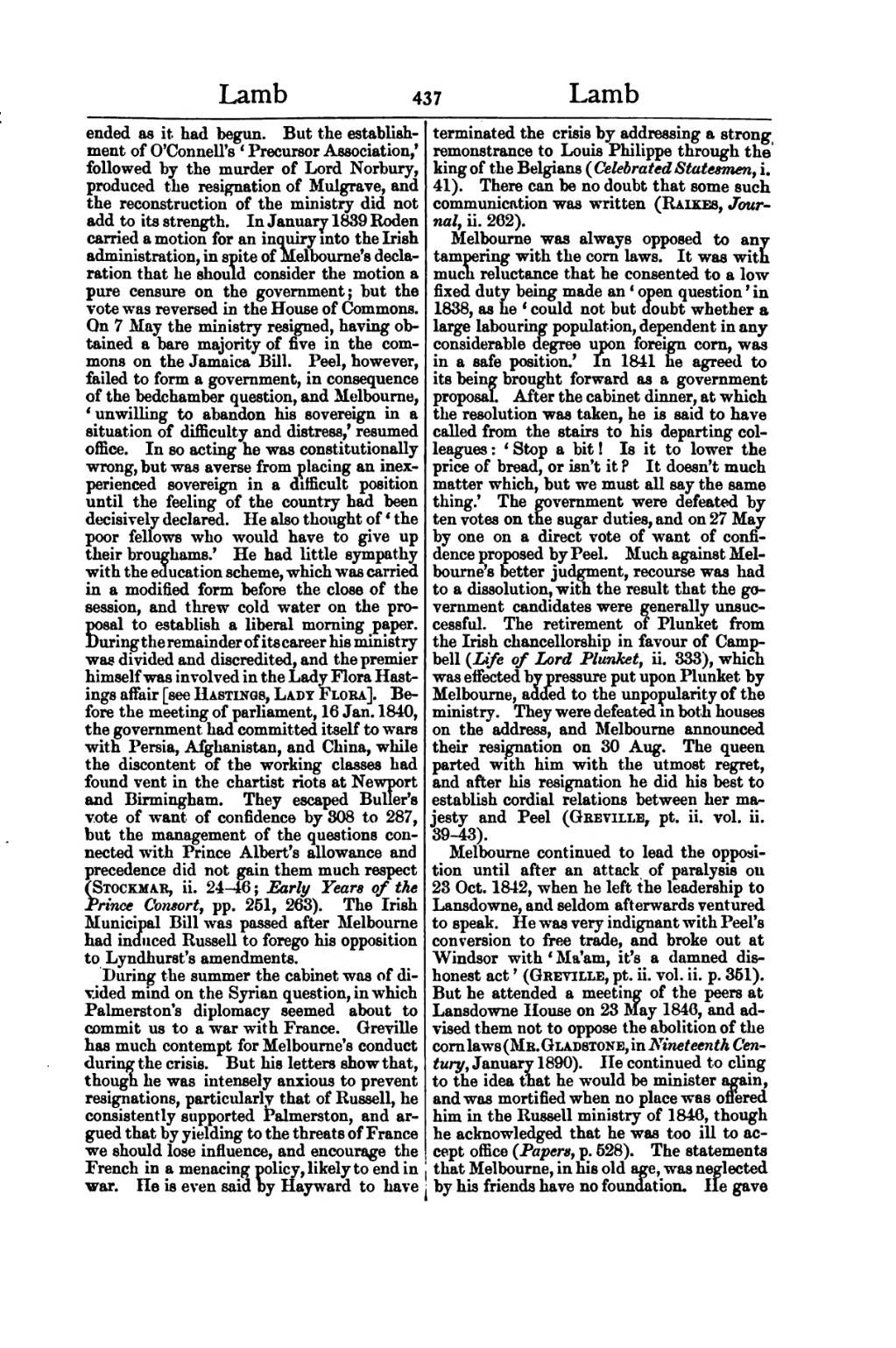ended as it had begun. But the establishment of O'Connell's ‘Precursor Association,’ followed by the murder of Lord Norbury, produced the resignation of Mulgrave, and the reconstruction of the ministry did not add to its strength. In January 1839 Roden carried a motion for an inquiry into the Irish administration, in spite of Melbourne's declaration that he should consider the motion a pure censure on the government; but the vote was reversed in the House of Commons. On 7 May the ministry resigned, having obtained a bare majority of five in the commons on the Jamaica Bill. Peel, however, failed to form a government, in consequence of the bedchamber question, and Melbourne, ‘unwilling to abandon his sovereign in a situation of difficulty and distress,’ resumed office. In so acting he was constitutionally wrong, but was averse from placing an inexperienced sovereign in a difficult position until the feeling of the country had been decisively declared. He also thought of ‘the poor fellows who would have to give up their broughams.’ He had little sympathy with the education scheme, which was carried in a modified form before the close of the session, and threw cold water on the proposal to establish a liberal morning paper. During the remainder of its career his ministry was divided and discredited, and the premier himself was involved in the Lady Flora Hastings affair [see Hastings, Lady Flora]. Before the meeting of parliament, 16 Jan. 1840, the government had committed itself to wars with Persia, Afghanistan, and China, while the discontent of the working classes had found vent in the chartist riots at Newport and Birmingham. They escaped Buller's vote of want of confidence by 308 to 287, but the management of the questions connected with Prince Albert's allowance and precedence did not gain them much respect (Stockmar, ii. 24–46; Early Years of the Prince Consort, pp. 251, 263). The Irish Municipal Bill was passed after Melbourne had induced Russell to forego his opposition to Lyndhurst's amendments.
During the summer the cabinet was of divided mind on the Syrian question, in which Palmerston's diplomacy seemed about to commit us to a war with France. Greville has much contempt for Melbourne's conduct during the crisis. But his letters show that, though he was intensely anxious to prevent resignations, particularly that of Russell, he consistently supported Palmerston, and argued that by yielding to the threats of France we should lose influence, and encourage the French in a menacing policy, likely to end in war. He is even said by Hayward to have terminated the crisis by addressing a strong remonstrance to Louis Philippe through the king of the Belgians (Celebrated Statesmen, i. 41). There can be no doubt that some such communication was written (Raikes, Journal, ii. 262).
Melbourne was always opposed to any tampering with the corn laws. It was with much reluctance that he consented to a low fixed duty being made an ‘open question’ in 1838, as he ‘could not but doubt whether a large labouring population, dependent in any considerable degree upon foreign corn, was in a safe position.’ In 1841 he agreed to its being brought forward as a government proposal. After the cabinet dinner, at which the resolution was taken, he is said to have called from the stairs to his departing colleagues: ‘Stop a bit! Is it to lower the price of bread, or isn't it? It doesn't much matter which, but we must all say the same thing.’ The government were defeated by ten votes on the sugar duties, and on 27 May by one on a direct vote of want of confidence proposed by Peel. Much against Melbourne's better judgment, recourse was had to a dissolution, with the result that the government candidates were generally unsuccessful. The retirement of Plunket from the Irish chancellorship in favour of Campbell (Life of Lord Plunket, ii. 333), which was effected by pressure put upon Plunket by Melbourne, added to the unpopularity of the ministry. They were defeated in both houses on the address, and Melbourne announced their resignation on 30 Aug. The queen parted with him with the utmost regret, and after his resignation he did his best to establish cordial relations between her majesty and Peel (Greville, pt. ii. vol. ii. 39–43).
Melbourne continued to lead the opposition until after an attack of paralysis on 23 Oct. 1842, when he left the leadership to Lansdowne, and seldom afterwards ventured to speak. He was very indignant with Peel's conversion to free trade, and broke out at Windsor with ‘Ma'am, it's a damned dishonest act’ (Greville, pt. ii. vol. ii. p. 351). But he attended a meeting of the peers at Lansdowne House on 23 May 1846, and advised them not to oppose the abolition of the corn laws (Mr. Gladstone, in Nineteenth Century, January 1890). He continued to cling to the idea that he would be minister again, and was mortified when no place was offered him in the Russell ministry of 1846, though he acknowledged that he was too ill to accept office (Papers, p. 528). The statements that Melbourne, in his old age, was neglected by his friends have no foundation. He gave
